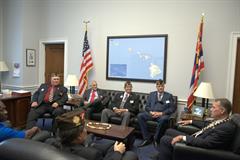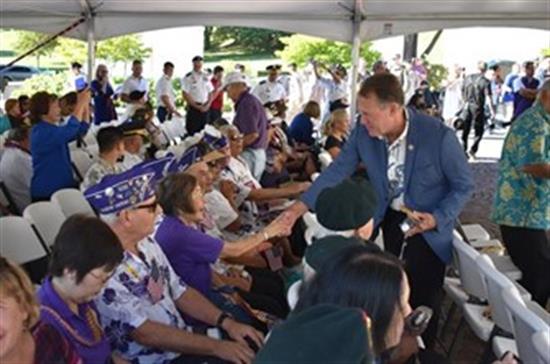I am deeply honored to represent some 112,000 Hawai‘i veterans and their families. This is a responsibility I take very seriously, especially as our veterans ‘ohana is one of the largest percentages of any state in our nation both overall and in key areas like women and minority veterans and delivery of services is often complicated by our unique qualities.

As a result, our veterans community sometimes faces unique challenges in Hawai‘i and throughout the Pacific that require targeted advocacy with our federal government and tailored solutions. I am especially able to address these issues and the broader challenges facing all of our country’s veterans as a member of the House Appropriations Committee, which has responsibility for overseeing and funding of all of our federal veterans programs. My focus areas are:
- Addressing the unique concerns of veterans living in Hawai‘i,
- Improving the healthcare and other benefits provided by the Department of Veterans Affairs (VA), and
- Assisting veterans with their individual needs.
Addressing Hawai‘i Veterans’ Needs
Hawaii’s veterans often face unique challenges that others on the mainland don’t have to face. It is my priority to tackle these issues head-on. Below are four examples:
- Benefits for Native Hawaiian Veterans. Native Hawaiians have a long history of proudly serving in our military, yet recent data also shows that Native Hawaiians are disproportionality represented in Hawaii’s homeless population. That is why I fought to secure $12 million for the Native American Veteran Housing Loan Program in the current version of the House’s Fiscal Year 2026 VA funding bill. This program offers lower closing costs and lower interest rates on mortgages to Native Hawaiian veterans.
- Telehealth and Connected Care. Telehealth and Connected Care programs benefit Neighbor Island and Pacific Island veterans who must otherwise fly to O‘ahu to receive certain kinds of care. I have advocated for these programs, and Congress has since directed the VA to expand telehealth availability and connected care programs, which has been helping more veterans in Hawai‘i receive the health counselling and consultation they need without having to visit the congested Tripler campus.
- Parking at the Spark M. Matsunaga VA Medical Center. I am working closely with the VA Pacific Islands Health Care System, Tripler Army Medical Center and senior military leaders in Washington to find a solution to the parking problem at the Spark M. Matsunaga VA Medical Center. Reports of veterans walking from far away lots or missing appointments completely due to a lack of parking are shocking and unacceptable. I am committed to finding a solution.
- Focused Healthcare for Native Hawaiians and Pacific Islanders. I continue to advocate for the VA Center for Native Hawaiian, Pacific Islander and United States-affiliated Pacific Islander (NHPIUSAPI) Veterans. The NHPIUSAPI Veterans Health Center, in partnership with University of Hawai‘i, will identify the medical, mental health and healthcare needs of Native Hawaiian and Pacific Islander veterans. I helped secure language in the House’s version of the Fiscal Year 2026 VA funding bill that directs the VA to continue partnering with universities in the Pacific region focusing on issues unique to the NHPIUSAPI community.
Strengthening Veterans’ Healthcare
An efficient and effective veterans' healthcare system is critical to keeping our nation’s promises to our veterans, yet too often veterans do not receive the help they desperately need. To help keep our promises, as a Member of the House Appropriations Committee, for Fiscal Year 2026 I helped draft legislation that would provide $133.7 billion in discretionary spending for veterans-related programs, an increase of $4.7 billion above the Fiscal Year 2025 enacted level. This included increases for mental preventative health and wellness, gender-specific healthcare, telehealth access and substance-use disorder efforts.
In efforts to improve veterans’ healthcare infrastructure in Hawaii, I worked to drive to complete the Daniel Kahikina Akaka Department of Veterans Affairs Community-based Outpatient Clinic. On April 5, 2024, the $130 million, 88,675 square-foot multi-specialty outpatient clinic opened. It now provides primary and mental health care, x-ray, laboratory and diagnostic services, pharmacy services and specialty care for veterans in our Hawai‘i and throughout the Pacific Islands. This clinic will alleviate the significant and growing logistical and capacity challenges at Tripler Army Medical Center.
PACT Act
I voted to help expand access to care for all our veterans exposed to toxic substances in the line of duty through the Sergeant First Class Heath Robinson Honoring our Promise to Address Comprehensive Toxics (PACT) Act. With the enactment of this measure, we have held true to our promise to our nation's veterans that we will care for them when they come home.
In September 2024, Congress approved with my support and President Biden signed into law the Veterans Benefits Continuity and Accountability Supplemental Appropriations Act. It provided an immediate $3 billion to ensure that veterans continue to receive assistance under our landmark PACT Act.
Since the PACT Act was enacted, the VA has expanded its eligibility to all veterans who served in the Vietnam War, the Gulf War, Iraq, Afghanistan, the Global War on Terror, or any other combat zone after 9/11. It also expands eligibility to veterans who never deployed but were exposed to toxins or hazards while training or on active duty in the United States.
Recognizing the harms inflicted by exposure to burn pits and airborne hazards, the PACT Act codified a presumption that servicemembers stationed in certain theatres were exposed to toxic substances at particular times. This legislation shifted the burden of proof off veterans and their loved ones and eased access to care for a broad array of conditions and cancers. It also streamlined the VA’s processes for establishing toxic exposure presumptions, ensuring that veterans do not have to wait decades for help.
With the enactment of this measure, we have held true to our promise to our nation's veterans that we will care for them when they come home. To apply for PACT Act benefits or learn more about eligibility requirements please click HERE.
Staying Connected
I regularly report back to our Hawaii’s veterans on some of my activities in Congress on their behalf, seek their continued guidance, and invite them to join me personally or remotely at special talk story community meetings. You can review my veterans newsletters HERE and my veterans talk stories HERE.

Assisting with Your Individual Needs
One of my most critical responsibilities as your Congressman is to help with your individual needs. Although I cannot mandate a particular result or override the decision of a federal agency, I can often assist with answering questions, finding solutions or simply cutting through red tape to ensure veterans receive the benefits they are entitled to receive. If you or a veteran you know has questions or requires assistance, please do not hesitate to contact my office at https://case.house.gov/forms/casework.



